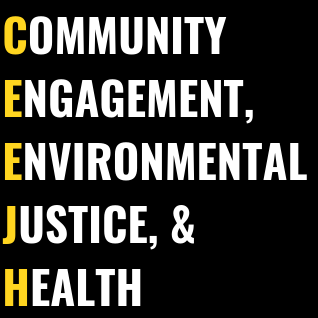Charleston Area Pollution Prevention Partnership (CAPs)
In 2021, Charleston, SC will open a new marine container terminal that will add 1.4 million more containers each year, nearly doubling the port’s volume, and likely increasing air pollutants in nearby communities already disproportionately burdened by environmental hazards and poor air quality, as shown by prior research. The pollutants will come from emissions from goods movement vehicles, such as ships, trucks and dock transports, and increased rail traffic, all of which prior experience shows will further degrade air quality.
For more than ten years, an innovative community-university-government partnership, known as the Charleston Area Pollution Prevention Partnership between the Low Country Alliance for Model Communities (LAMC), Charleston Community Research to Action Board (CCRAB), the University of Maryland, the Medical University of South Carolina (MUSC), the University of South Carolina (USC), and the SC Department of Health and Environmental Control (SCDHEC) has been working to assess environmental pollution, exposure disparities, and public health issues in economically distressed communities in the Charleston region impacted by goods movement and other local industrial activity before the Charleston port expansion. Guided by the community-based participatory research (CBPR) framework and collaborative-problem solving model (CPSM) principles, CAPs has an overarching goal to address environmental injustice, public health, and revitalization issues in North Charleston, South Carolina (SC).
Through this authentic and transformative collaborative partnership, we have shown a positive impact in neighborhoods of concern through air pollution monitoring efforts, education of residents on local environmental health issues, GIS mapping of hazard-related burden disparities, and use of novel tools to build capacity of residents to be more engaged in local environmental decision-making, Through this partnership, we have shut down the Charleston County incinerator, changed zoning, improved access to green space, and helped with mitigation of negative impacts from the port expansion. We are currently providing technical assistance to LAMC and CCRAB on resiliency efforts including establishment of an environmental benefits district. In addition, we are working to build a hyperlocal community-based air quality monitoring network in the region.
Read more about our work in Charleston:
Burwell-Naney, K., Wilson, S. M., He, X., Sapkota, A., & Puett, R. (2018). Development of a Cumulative Stressors and Resiliency Index to Examine Environmental Health Risk: A South Carolina Assessment. Environmental Justice, 11(4), 165-175.
Commodore, A., Wilson, S., Muhammad, O., Svendsen, E., & Pearce, J. (2017). Community-based participatory research for the study of air pollution: a review of motivations, approaches, and outcomes. Environmental monitoring and assessment, 189(8), 378.
Burwell-Naney, K., Wilson, S. M., Tarver, S. L., Svendsen, E., Jiang, C., Ogunsakin, O. A., ... & Fraser-Rahim, H. (2017). Baseline air quality assessment of goods movement activities before the port of Charleston expansion: a community–university collaborative. Environmental Justice, 10(1), 1-10.
Pearce, J., Commodore, A., Neelon, B., Boaz, R., Bozigar, M., Wilson, S., & Svendsen, E. (2017). A novel approach for characterizing neighborhood-level trends in particulate matter using concentration and size fraction distributions: a case study in Charleston, SC. Air Quality, Atmosphere & Health, 10(10), 1181-1192.
Rice, L. J., Brandt, H. M., Hardin, J. W., Ingram, L. A., & Wilson, S. M. (2015). Exploring perceptions of cancer risk, neighborhood environmental risks, and health behaviors of Blacks. Journal of community health, 40(3), 419-430.
Rice, L. J., Jiang, C., Wilson, S. M., Burwell-Naney, K., Samantapudi, A., & Zhang, H. (2014). Use of segregation indices, Townsend Index, and air toxics data to assess lifetime cancer risk disparities in metropolitan Charleston, South Carolina, USA. International journal of environmental research and public health, 11(5), 5510-5526.
Wilson, S., Campbell, D., Dalemarre, L., Fraser-Rahim, H., & Williams, E. (2014). A critical review of an authentic and transformative environmental justice and health community—University partnership. International journal of environmental research and public health, 11(12), 12817-12834.
Svendsen, E. R., Reynolds, S., Ogunsakin, O. A., Williams, E. M., Fraser-Rahim, H., Zhang, H., & Wilson, S. M. (2014). Assessment of particulate matter levels in vulnerable communities in North Charleston, South Carolina prior to port expansion. Environmental health insights, 8, EHI-S12814.
Dalemarre, L., Wilson, S. M., Campbell, D., Fraser-Rahim, H., & Williams, E. M. (2014). Summary on the Charleston Area Pollution Prevention Partnership Environmental Justice Conference and Summit. Environmental Justice, 7(3), 81-86.
Wilson, S. M., Campbell, D., Burwell, K., Rice, L., & Williams, E. M. (2012). Assessment and impact of a summer environmental justice and health enrichment program: A model for pipeline development. Environmental Justice, 5(6), 279-286.
Wilson, S. M., Fraser-Rahim, H., Zhang, H., Williams, E. M., Samantapudi, A. V., Ortiz, K., ... & Sakati, W. (2012). The spatial distribution of leaking underground storage tanks in Charleston, South Carolina: an environmental justice analysis. Environmental Justice, 5(4), 198-205.
Wilson, S. M., Fraser-Rahim, H., Williams, E., Zhang, H., Rice, L., Svendsen, E., & Abara, W. (2012). Assessment of the distribution of toxic release inventory facilities in metropolitan Charleston: An environmental justice case study. American journal of public health, 102(10), 1974-1980.
Wilson, S. M., Rice, L., & Fraser-Rahim, H. (2011). The use of community-driven environmental decision making to address environmental justice and revitalization issues in a port community in South Carolina. Environmental Justice, 4(3), 145-154.
Wilson, S., Aber, A., Ravichandran, V., Wright, L., & Muhammad, O. (2017). Soil Contamination in Urban Communities Impacted by Industrial Pollution and Goods Movement Activities. Environmental Justice, 10(1), 16-22.

